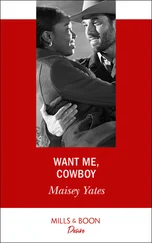“Look at those boots,” Opal scolded with that strange, gruff tenderness she reserved for people in need of her guidance and correction. “Bet the soles are caked with manure.”
Hutch sighed. He’d scraped them clean outside, on the porch, as he’d been taught to do around the time he started wearing boots.
“With you over here,” he quipped, “who’s going to nag Slade Barlow?”
“Shea’s mama got in early,” Opal replied, spearing pieces of chicken onto a platter with a meat fork. “So I figured I might as well get started setting things to rights around here.”
Hutch dried his hands on a towel and grinned at her. “You’re off to a good start with supper,” he conceded.
She chuckled. “I made mashed potatoes and gravy, too, and boiled up some green beans with bacon and onion to boot. Sit yourself down, Hutch Carmody, and eat the first balanced meal you’ve probably had in a month of Sundays.”
He waited until all the food was on the table and Opal was seated before taking a chair, wryly amused to recall that this was just the scenario he’d imagined for himself earlier.
Only the woman was different.
CHAPTER SEVEN
THE MANSION ON Rodeo Road seemed strangely hollow the next morning when Kendra stepped through the front door, even though most of the original furniture remained and there were painters and other workers in various rooms throughout.
Standing in the enormous entryway, she tipped her head back and looked up at the exquisite ceiling, waited for a pang of regret—some kind of sadness was to be expected, she supposed, given that she’d spent part of her life here. She’d wanted so much to live in this house, long before she’d met and married Jeffrey Chamberlain, and after her marriage a number of dreams had lived—and died—right here in these rooms.
Somewhat surprisingly, what Kendra actually felt was a swell of relief, a healthy sense of letting go, of moving on, even of becoming some more complete and authentic version of herself.
There was comfort in that, even exhilaration.
When she’d first set foot in the place, as an awestruck little girl recently dumped on the porch of a rundown double-wide on the wrong side of the railroad tracks, Joslyn had been the one who lived here, along with her mom, Dana, and stepfather, Elliott, and, of course, Opal.
To Kendra the place had seemed like a castle, especially at Christmas, with Joslyn as resident princess.
During her childhood and her teens, the mere scope of that house had amazed Kendra—there were rooms not just for sleeping or eating or bathing, like in most homes, but ones set aside just for plants to grow in, or for playing cards and watching TV, or for reading books and doing homework or simply for sitting . Her grandmother’s trailer had closets, of course, but here there were dressing rooms, too, with glass cubicles for shoes and handbags, and what seemed like a million bathrooms. There had even been a nook—several times larger than the living room in the double-wide—set aside for wrapping gifts, tying them up with elaborate bows, decorating them with small ornaments or glittery artificial flowers.
To a child who was handed money and told to buy her own birthday and Christmas presents, the mere concept of such finery had been magical.
Alas Kendra had been quick enough to realize, once she became the mistress of this monstrosity of a place, that it was never the structure itself, or any of its fancy trappings, that she’d wanted.
Instead it was the family, the sense of fitting in and belonging somewhere, of being a valued part of something larger.
Seen from the outside, Joslyn’s life had certainly seemed happy in those early days, even enchanted, although a shattering scandal would eventually erupt, leaving everything in ruins.
Before her stepfather’s financial fall from grace, when he’d ripped off friends and strangers alike, Joslyn had had it all—and while some people had been jealous of her and thought of her as spoiled and self-centered, Kendra had seen a different side of Joslyn. She’d shown empathy for Kendra’s very different situation, but never pity, and she’d been willing to share her toys and her skates and, later on, her beautiful clothes.
More importantly, Joslyn had shared her mom and Opal and the little cocker spaniel, Spunky. Elliott Rossiter, the stepfather, had come and gone, funny and affable and generous, but always busy doing something important.
Stealing, as it turned out.
As an adult, Kendra had hoped to fulfill at least a part of her own dream with Jeffrey—the formation of a family—and in a roundabout way, she’d succeeded, because she had Madison now.
“Hello?” The voice startled Kendra out of her musings, even though she’d known she wasn’t alone, having seen the painters’ and cleaning service’s vans in the driveway.
Charlie Duke, who ran Duke’s Painting and Construction, stepped into view, clad in splotched overalls and wiping his hands on a shop rag. He grinned, showing the wide gap between his front teeth.
“Mornin’, Ms. Shepherd,” he said. “Here to see how the place is comin’ along, are you?”
Kendra smiled. “Something like that,” she replied. She’d known Charlie and his wife, Tina, for years and in the post office or the grocery store or over at the Butter Biscuit Café, either one of them would have addressed her simply as “Kendra,” but the Dukes were old-fashioned people. When Charlie was on the job, all exchanges were formal, and Kendra was “Ms. Shepherd.”
“We’ve about finished up in the main parlor,” Charlie told her, with quiet pride, leading the way along the corridor. He wore paper booties over his work boots, and his T-shirt had a hole in the right shoulder, only partially covered by one of his overall straps.
Kendra followed, like someone taking a tour of some grand residence in an unfamiliar country.
It was almost as though she’d never been inside the place before, which was crazy of course, but such was her mood—reflective, calmly detached.
The parlor had been her office, as well as the main reception area for Shepherd Real Estate, and what furniture she hadn’t moved over to the storefront was still in place, though covered by huge canvas tarps. The walls, formerly a soft shade of dusty rose, were now eggshell, neutral colors allegedly being the way to go when a house was on the market, in the hope of appealing to a broader spectrum of potential buyers.
Kendra did a quick walk-through—no small undertaking in a house the size of the average high school gymnasium—greeted Charlie’s two sons, who were busy painting the kitchen a very pale yellow, and various members of the cleaning team, perched stoutly on high ladders, polishing window glass, and then went back to her car, where Daisy waited patiently in the passenger seat. They’d dropped Madison off at preschool first thing, the two of them, and the next stop was Kendra’s office.
Upon arriving there, she took Daisy for a quick turn around the parking lot and then they both entered through the back way.
While Daisy explored the space—she’d been there before but, in her canine brain, there was always the exciting possibility that something had changed since the last visit—sniffing at silk plants and file cabinets and windowsills, Kendra booted up her computer, unlocked the front door and turned the Closed sign around to read Open.
She was in the tiny, closed-off kitchenette/storage room, starting a pot of coffee brewing, when she heard someone come in from the street. Daisy’s low, almost inquisitive growl made her hurry back to the main part of the office.
The man standing just inside the door was strikingly handsome, wearing the regulation jeans, boots, Western-cut shirt and hat, as most men in Parable did.
Читать дальше












